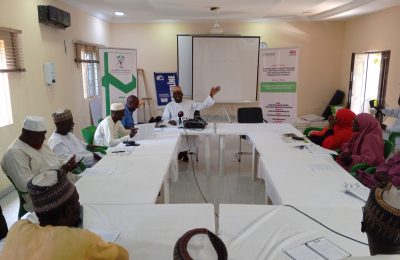By-Collins Nnabuife, Abuja
The Centre for Democracy and Development (CDD), through its Election Analysis Centre (EAC), said its observation after the Independent National Electoral Commission (INEC) mock accreditation exercise indicated dampened the confidence of some voters over the misconception that the malfunction of the BVAS was responsible for the Election Petition Tribunal judgement, which nullified the victory of the INEC declared winner in the Osun State Governorship election of July 2022.

CDD said this misconception about the role of the BVAS in nullifying earlier declared victories would have to be urgently addressed by INEC to prevent voter apathy in the actual elections, come February 25 and March 11, 2023.
It also recommends urgent steps by INEC to address logistic challenges, particularly the late arrival of poll officials.
CDD, through EAC, deployed 111 field observers to monitor the mock accreditation exercise conducted by the Independent National Electoral Commission (INEC) on Saturday, February 4, 2023. CDD deployed three (3) observers per state across the 36 states and the Federal Capital Territory (FCT).

The mock accreditation exercise, which INEC conducted across 436 polling units, was organised to test the functionality and reliability of the Bimodal Voter Accreditation System (BVAS) ahead of the February 25 and March 11, 2023 elections. INEC conducted the mock accreditation in one out of every 405 polling units.
CDD, in a statement signed by its Director, Idayat Hassan, said this fundamentally means that for every polling unit where the accreditation took place, there were at least 404 others left out – such a wide vacuum is already a concern. Only 436 of 176,846 polling units were covered, which is less than one per cent of the area to be covered.

The statement said that based on field observers’ data on the exercise, CDD EAC found instances of the late arrival of INEC officials to their respective polling units.
“In several cases, INEC poll officials had not arrived for the commencement of the process by 11:30 am, whereas they were supposed to have arrived between 8:00 and 8:30 am. These instances of the late arrival of poll officials were documented in polling units at Community Primary School, Enugu, Ngwo, where officials arrived at 11 am.
“In Kungana Special Primary School, Suntai, Taraba State, and Polling Unit 002 at Damilu Primary School, Jimeta, observer data indicated that poll officials arrived at 11:30 am, three and half hours behind the scheduled time. Late arrival of INEC officials was recorded in many of the 36 states and in 58% of the 111 polling units observed.
“Our observer data shows that the BVAS worked smoothly across most polling units observed. At an average of between 30 seconds and two minutes, the BVAS-accredited voters showed up for the exercise.
“Although CDD EAC observer data recorded isolated instances where the BVAS experienced glitches while trying to capture the fingerprints and facial features of elderly voters, the device eventually used either the fingerprint or facial mode to get the details of the senior citizens. Our observer data indicates that the BVAS recorded more biometric authentication through facial recognition than through fingerprint.
“In State Primary School, Otuokpoti Ward 2 located in Ogbia Local Government Area of Bayelsa State, observer data showed that out of the six voters accredited as at 11:40 am, five were authenticated through facial recognition, while only one voter was accredited using fingerprint authentication.
“Our observation of the mock accreditation exercise similarly documented a spate of low turnout of voters for the exercise”, the statement said.
CDD said in several polling units that less than 3 per cent of registered voters participated in the mock accreditation and voting. It said the low turnout was traced to low awareness.
“The poor awareness and subsequent low turnout made a comprehensive assessment of the BVAS impossible. Our observers similarly recorded cases of voters who were not registered at the polling units where the mock accreditation took place, showing up to participate in the exercise due to a lack of information about how the process was being conducted.
“It was noted that many voters who had collected their Permanent Voters Cards (PVCs) simply assumed they could be part of the process as long as they had their PVCs.
“This was the situation at the Polling Unit located in Ebsu Primary School in Azumiri Azugwu Ward, where scores of voters who wanted to participate in the process were disappointed as they were turned back.
“In the course of the mock accreditation exercise, CDD EAC observer deployed in Polling Unit 3, Aghazie Square, Onusa Ward in Nkwerre LGA of Imo State, reported being harassed and intimidated by security officials attached to some government functionaries in the State”, CDD said.








